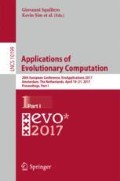Abstract
Social information can provide information about the presence, state and intentions of other agents; therefore it follows that the use of social information may be of some adaptive benefit. As with all information, social information must be interpretable and relatively accurate given the situation in which it is derived. In both nature and robotics, agents learn which social information is relevant and under which circumstances it may be relied upon to provide useful information about the current environmental state. However, it is not clear to what extent social information alone is beneficial when decoupled from a within-lifetime learning process, leaving evolution to determine whether social information provides any long term adaptive benefits. In this work we assess this question of the adaptive value of social information when it is not accompanied by a within-lifetime learning process. The aim here is to begin to understand when social information, here expressed as a form of public information, is adaptive; the rationale being that any social information that is adaptive without learning will be a good base to allow the learning processes associated with social information to evolve and develop later. Here we show, using grounded neuroevolutionary artificial life simulations incorporating simulated agents, that social information can in certain circumstances provide an adaptive advantage to agents, and that social information that more accurately indicates success confers more reliable information to agents leading to improved success over less reliable sources of social information.
References
King, A.J., Cowlishaw, G.: When to use social information: the advantage of large group size in individual decision making. Biol. Lett. 3(2), 137–139 (2007)
Bonnie, K.E., Earley, R.L.: Expanding the scope for social information use. Anim. Behav. 74(2), 171–181 (2007)
Nolfi, S., Floreano, D.: Learning and evolution. Auton. Rob. 7(1), 89–113 (1999)
Borg, J.M., Channon, A., Day, C.: Discovering and maintaining behaviours inaccessible to incremental genetic evolution through transcription errors and cultural transmission. In: ECAL 2011: Proceedings of the Eleventh European Conference on the Synthesis and Simulation of Living Systems, pp. 101–108. MIT Press (2011)
Whiten, A., Van Schaik, C.P.: The evolution of animal cultures and social intelligence. Philos. Trans. Roy. Soc. B: Biol. Sci. 362(1480), 603–620 (2007)
Reader, S.M., Biro, D.: Experimental identification of social learning in wild animals. Learn. Behav. 38(3), 265–283 (2010)
Kendal, J.R., Rendell, L., Pike, T.W., Laland, K.N.: Nine-spined sticklebacks deploy a hill-climbing social learning strategy. Behav. Ecol. 20(2), 238–244 (2009)
Galef, B.G.: Social learning and traditions in animals: evidence, definitions, and relationship to human culture. Wiley Interdisc. Rev.: Cogn. Sci. 3(6), 581–592 (2012)
Zwirner, E., Thornton, A.: Cognitive requirements of cumulative culture: teaching is useful but not essential. Sci. Rep. 5 (2015). Article no. 16781
Jolley, B.P., Borg, J.M., Channon, A.: Analysis of social learning strategies when discovering and maintaining behaviours inaccessible to incremental genetic evolution. In: Tuci, E., Giagkos, A., Wilson, M., Hallam, J. (eds.) SAB 2016. LNCS (LNAI), vol. 9825, pp. 293–304. Springer, Heidelberg (2016). doi:10.1007/978-3-319-43488-9_26
Whitehead, H., Richerson, P.J.: The evolution of conformist social learning can cause population collapse in realistically variable environments. Evol. Hum. Behav. 30(4), 261–273 (2009)
Borg, J.M., Channon, A.: Testing the variability selection hypothesis - the adoption of social learning in increasingly variable environments. In: ALIFE 13: The Thirteenth Conference on the Synthesis and Simulation of Living Systems, pp. 317–324. MIT Press (2012)
Rendell, L., Fogarty, L., Hoppitt, W.J., Morgan, T.J., Webster, M.M., Laland, K.N.: Cognitive culture: theoretical and empirical insights into social learning strategies. Trends Cogn. Sci. 15(2), 68–76 (2011)
van der Post, D.J., Franz, M., Laland, K.N.: Skill learning and the evolution of social learning mechanisms. BMC Evol. Biol. 16(1), 166 (2016)
Noble, J., Todd, P.M.: Imitation or something simpler? Modeling simple mechanisms for social information processing. In: Nehaniv, C.L., Dautenhahn, K. (eds.) Imitation in Animals and Artifacts, pp. 423–439. MIT Press, Cambridge (2002)
McNamara, J.M., Dall, S.R.: Information is a fitness enhancing resource. Oikos 119(2), 231–236 (2010)
Mitri, S., Floreano, D., Keller, L.: The evolution of information suppression in communicating robots with conflicting interests. Proc. Nat. Acad. Sci. 106(37), 15786–15790 (2009)
Watson, R.A., Szathmáry, E.: How can evolution learn? Trends Ecol. Evol. 31(2), 147–157 (2016)
Floreano, D., Keller, L.: Evolution of adaptive behaviour in robots by means of darwinian selection. PLoS Biol. 8(1), e1000292 (2010)
Channon, A.D., Damper, R.: The evolutionary emergence of socially intelligent agents. In: Edmonds, B., Dautenhahn, K. (eds.) Socially Situated Intelligence: A Workshop Held at SAB 1998, University of Zurich Technical Report, pp. 41–49 (1998)
Danchin, É., Giraldeau, L.A., Valone, T.J., Wagner, R.H.: Public information: from nosy neighbors to cultural evolution. Science 305(5683), 487–491 (2004)
Yang, S.X., Meng, M.: An efficient neural network approach to dynamic robot motion planning. Neural Netw. 13(2), 143–148 (2000)
Robinson, E., Ellis, T., Channon, A.: Neuroevolution of agents capable of reactive and deliberative behaviours in novel and dynamic environments. In: Almeida e Costa, F., Rocha, L.M., Costa, E., Harvey, I., Coutinho, A. (eds.) ECAL 2007. LNCS (LNAI), vol. 4648, pp. 345–354. Springer, Heidelberg (2007). doi:10.1007/978-3-540-74913-4_35
Stanton, A., Channon, A.: Incremental neuroevolution of reactive and deliberative 3D agents. In: ECAL 2015: Proceedings of the Thirteenth European Conference on the Synthesis and Simulation of Living Systems, pp. 341–348. MIT Press (2015)
Acerbi, A., Marocco, D., Nolfi, S.: Social facilitation on the development of foraging behaviors in a population of autonomous robots. In: Almeida e Costa, F., Rocha, L.M., Costa, E., Harvey, I., Coutinho, A. (eds.) ECAL 2007. LNCS (LNAI), vol. 4648, pp. 625–634. Springer, Heidelberg (2007). doi:10.1007/978-3-540-74913-4_63
Author information
Authors and Affiliations
Corresponding author
Editor information
Editors and Affiliations
Rights and permissions
Copyright information
© 2017 Springer International Publishing AG
About this paper
Cite this paper
Borg, J.M., Channon, A. (2017). Evolutionary Adaptation to Social Information Use Without Learning. In: Squillero, G., Sim, K. (eds) Applications of Evolutionary Computation. EvoApplications 2017. Lecture Notes in Computer Science(), vol 10199. Springer, Cham. https://doi.org/10.1007/978-3-319-55849-3_54
Download citation
DOI: https://doi.org/10.1007/978-3-319-55849-3_54
Published:
Publisher Name: Springer, Cham
Print ISBN: 978-3-319-55848-6
Online ISBN: 978-3-319-55849-3
eBook Packages: Computer ScienceComputer Science (R0)

